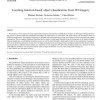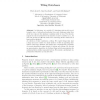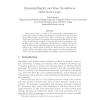1634 search results - page 212 / 327 » Reasoning about Knowledge Using Rough Sets |
PLDI
2011
ACM
13 years 1 months ago
2011
ACM
Program analysis and verification tools crucially depend on the ability to symbolically describe and reason about sets of program behaviors. Separation logic provides a promising...
CVIU
2008
13 years 10 months ago
2008
We propose a novel scheme for using supervised learning for function-based classification of objects in 3D images. During the learning process, a generic multi-level hierarchical ...
DIS
2004
Springer
14 years 3 months ago
2004
Springer
Abstract. In this paper, we consider 0/1 databases and provide an alternative way of extracting knowledge from such databases using tiles. A tile is a region in the database consis...
FSS
2008
13 years 10 months ago
2008
In the last decade defeasible argumentation frameworks have evolved to become a sound setting to formalize commonsense, qualitative reasoning. The logic programming paradigm has s...
KBS
2011
13 years 5 months ago
2011
Order-sorted logic is a useful tool for knowledge representation and reasoning because it enables representation of sorted terms and formulas along with partially ordered sorts (c...



